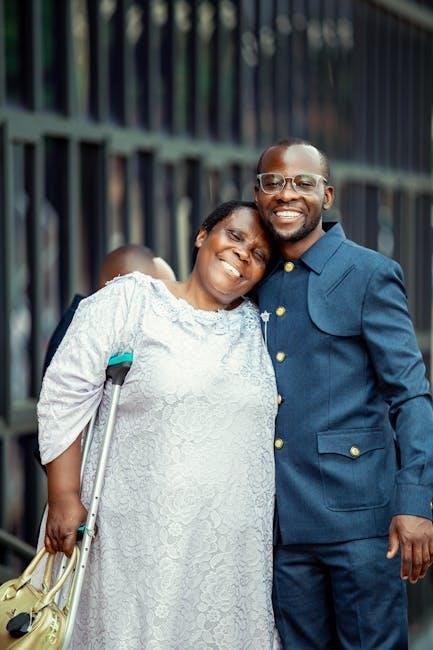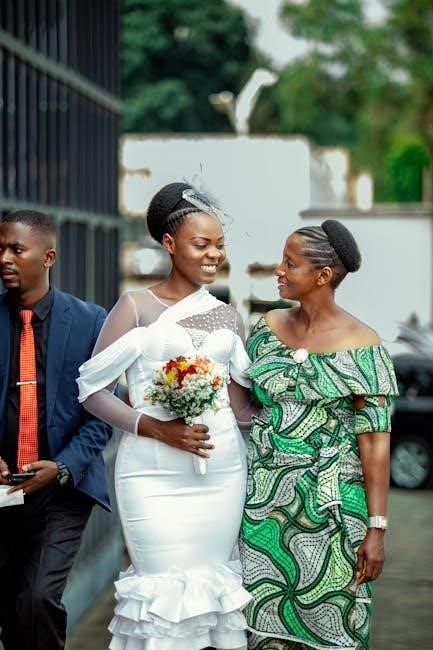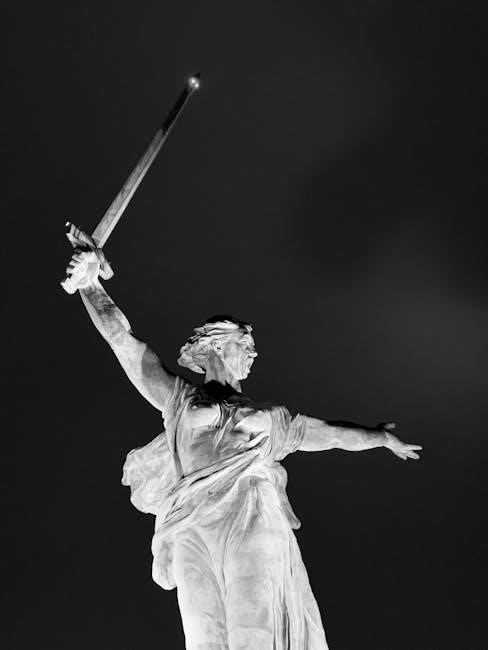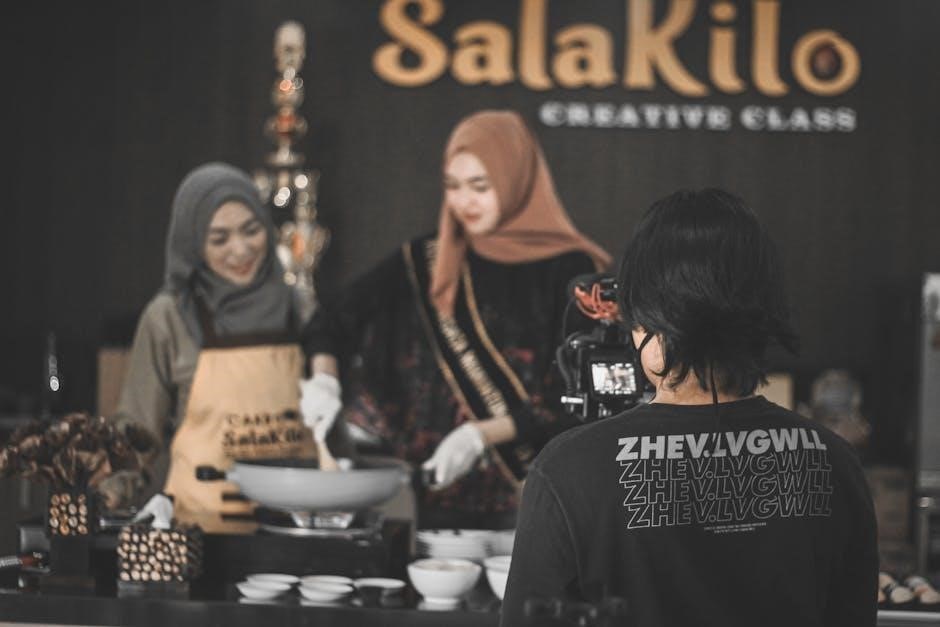Battle Hymn of the Tiger Mother, written by Yale professor Amy Chua in 2011, explores her strict parenting approach rooted in Chinese tradition, sparking global debate.
1.1 Background and Overview
Amy Chua, a Yale law professor, published Battle Hymn of the Tiger Mother in 2011, blending memoir with parenting philosophy. The book recounts her strict, tradition-rooted approach to raising her daughters, sparking controversy after a Wall Street Journal excerpt. Chua critiques Western parenting, advocating for high expectations and discipline, contrasting with permissive Western styles. Her methods, shaped by her Chinese heritage, emphasize achievement and resilience, igniting debates on cultural values and parenting effectiveness.
1.2 Purpose of the Book
Amy Chua’s Battle Hymn of the Tiger Mother aims to challenge Western parenting norms by advocating for a stricter, achievement-oriented approach. Chua shares her personal journey, detailing how she applied traditional Chinese parenting methods to her daughters. The book critiques the emphasis on self-esteem in Western parenting, arguing that high expectations and discipline foster success. Chua’s intent was to provoke thought on cultural differences in child-rearing, sparking a broader conversation about parenting styles and their impact on children’s outcomes.
The Controversy Surrounding the Book
Amy Chua’s book ignited intense debate due to its polarizing views on parenting, with critics accusing her of being overly harsh and culturally insensitive.
2.1 The Wall Street Journal Excerpt
A pivotal moment in the controversy arose when the Wall Street Journal published an excerpt titled “Why Chinese Mothers Are Superior.” This piece highlighted Amy Chua’s strict parenting methods, such as denying playdates and sleepovers, and prioritizing academic excellence above all else. The excerpt sparked widespread outrage, with many critics labeling her approach as extreme and emotionally damaging. However, Chua argued that her methods, rooted in Chinese cultural values, were designed to foster resilience and success in her children. The excerpt became a lightning rod for debate, polarizing opinions on parenting styles and cultural expectations.
2.2 Public Reaction and Debate
The Wall Street Journal excerpt ignited intense public reaction, with many labeling Chua’s methods as extreme and emotionally harmful. Critics argued her approach stifled creativity and led to anxiety, while supporters defended her emphasis on resilience and academic rigor. The debate extended beyond parenting, touching on cultural differences and expectations. Chua’s unapologetic stance sparked a broader conversation about the merits and flaws of both Eastern and Western parenting styles, polarizing opinions and challenging readers to reflect on their own upbringing and values.

Amy Chua’s Parenting Philosophy
Amy Chua’s philosophy centers on demanding excellence, emphasizing rigorous academic and extracurricular achievement, and fostering resilience through strict, traditional methods inspired by her Chinese upbringing.
3.1 The Tiger Parenting Approach
Amy Chua’s Tiger Parenting Approach emphasizes high expectations, strict discipline, and intense dedication to academic and extracurricular excellence. Chua believes in pushing children to their limits to prepare them for success in a competitive world. This approach, rooted in her Chinese heritage, involves continuous feedback, criticism, and sacrifice to ensure her children achieve exceptional results. She argues that this method builds resilience and determination, qualities she believes are essential for long-term achievement, though it has sparked debate over its emotional impact on children. The approach is a stark contrast to more permissive Western parenting styles.
3.2 Criticism of Western Parenting Styles
Amy Chua criticizes Western parenting for being overly permissive and child-centric, often prioritizing self-esteem over achievement. She argues that Western parents avoid pushing their children too hard, fearing it may harm their confidence. In contrast, Chua believes Tiger Parenting’s strict, demanding approach prepares children for life’s challenges; While some praise her candor, others accuse her of being overly harsh and dismissive of Western values like creativity and individuality. Her critique sparked widespread debate about cultural differences in parenting and the balance between support and expectation in raising successful, well-adjusted children.
Key Themes in the Book
The book explores themes of cultural heritage, academic excellence, and the clash between traditional and modern parenting values, highlighting their impact on child development and societal expectations.
4.1 The Role of Cultural Heritage
Amy Chua emphasizes the significance of cultural heritage in shaping her parenting approach. Drawing from her Chinese upbringing, she highlights the importance of preserving traditional values such as hard work, resilience, and filial loyalty. These values are passed down through generations, forming the foundation of her strict parenting methods. Chua believes that cultural heritage provides a sense of identity and moral guidance, which she strives to instill in her children. This cultural perspective often contrasts with Western parenting styles, creating a unique dynamic in her household. Heritage, for Chua, is not just tradition but a vital tool for success.
4.2 The Importance of Academic Excellence
In Battle Hymn of the Tiger Mother, Amy Chua underscores the paramount importance of academic excellence as a cornerstone of her parenting philosophy. She believes that rigorous academic achievement is essential for securing a successful future. Chua pushes her children to attain top grades, master musical instruments, and excel in extracurricular activities, often imposing intense pressure. This reflects her conviction that hard work and discipline are the keys to overcoming challenges. While her methods have sparked criticism, Chua argues that her approach ensures her children develop resilience and a strong work ethic, aligning with her broader philosophy of fostering excellence through relentless effort and high expectations.
The Impact of Tiger Parenting on Children
Tiger parenting emphasizes high academic achievement and strict discipline, often leading to exceptional performance but also raising concerns about emotional well-being and long-term psychological effects.
5.1 Academic Success and Achievement
Amy Chua’s tiger parenting approach often results in exceptional academic performance, with her children achieving top grades and excelling in extracurricular activities like music. Her strict, demanding methods, which emphasize hard work and sacrifice, are credited with fostering resilience and a strong work ethic. However, critics argue that this intense focus on achievement may come at the cost of emotional well-being, as children are pushed to meet high expectations without room for failure or exploration of personal interests.
5.2 Emotional and Psychological Effects
The tiger parenting approach has been criticized for its potential emotional and psychological impacts on children. Critics argue that the intense pressure to succeed can lead to stress, anxiety, and a fear of failure. Some children raised in this manner report feeling emotionally distant from their parents and struggling with self-esteem issues. However, supporters argue that the discipline and high expectations foster resilience and a strong sense of accomplishment. The book sparks debate about the balance between academic achievement and emotional well-being in childhood development.

The Cultural Context of Tiger Parenting
Battle Hymn of the Tiger Mother reflects the cultural values of traditional Chinese parenting, emphasizing discipline, hard work, and academic success, contrasting with Western parenting styles.
6.1 Traditional Chinese Values
Traditional Chinese values emphasized in Battle Hymn of the Tiger Mother include academic excellence, strict discipline, and filial piety. Chua highlights the importance of hard work, resilience, and sacrificing personal desires for family success. These values, rooted in Confucianism, prioritize collective harmony over individual needs. Chua’s approach reflects the cultural belief that parents must push children to their limits to ensure their future prosperity. This mindset often contrasts sharply with Western parenting, which tends to focus more on self-expression and emotional well-being. Chua’s methods, while controversial, stem from a deep respect for these cultural traditions.
6.2 The Clash with Western Parenting Norms
Amy Chua’s tiger parenting approach starkly contrasts with Western parenting norms, which often prioritize children’s emotional well-being and self-expression. Chua’s emphasis on strict discipline, academic rigor, and sacrifice clashed with Western ideals of nurturing creativity and individuality. The controversy intensified when the Wall Street Journal published an excerpt, sparking debates about cultural differences in parenting. Critics accused Chua of being overly harsh, while supporters argued her methods reflected a broader cultural philosophy. This clash highlights the tension between traditional, achievement-focused parenting and more permissive, child-centered approaches prevalent in Western societies.

Comparisons with Western Parenting Styles
Amy Chua’s tiger parenting contrasts sharply with Western styles, emphasizing strict discipline and high expectations versus Western focus on creativity and emotional well-being.
7.1 Differences in Expectations and Discipline
Tiger parenting, as outlined by Amy Chua, involves high academic expectations, strict discipline, and a focus on achievement. In contrast, Western parenting often prioritizes creativity, self-expression, and emotional well-being. Chua criticizes Western parents for being overly permissive, while tiger parents demand excellence, pushing children to succeed through intense practice and dedication. This clash in approaches reflects differing cultural values, with tiger parents emphasizing long-term success over short-term happiness, leading to debates about which style yields better outcomes for children in the long run.
7.2 Outcomes and Long-Term Effects
Tiger parenting often results in high academic achievement and resilience, as children are pushed to excel. However, critics argue that this approach may lead to emotional stress and anxiety. Western parenting, focusing on creativity and self-expression, is believed to foster independence and emotional well-being. Long-term effects of tiger parenting are debated, with some claiming it builds confidence and success, while others highlight potential psychological tolls. The contrast in outcomes reflects broader cultural values, raising questions about which approach better prepares children for life’s challenges and fosters lasting happiness.
The Book’s Reception and Reviews
Battle Hymn of the Tiger Mother sparked intense debate, with divided opinions on its parenting philosophy. Critics praised its cultural insights but criticized its rigid methods.
8.1 Positive Reviews and Support
Despite controversy, Battle Hymn of the Tiger Mother received admiration for its candor and cultural insights. Some reviewers praised Amy Chua’s unapologetic approach to parenting, highlighting its effectiveness in fostering resilience and academic excellence. The book was seen as a fresh perspective on traditional parenting values, resonating with those who appreciated its frank discussion of cultural heritage. While divisive, supporters argued that Chua’s methods, though strict, aimed to prepare children for success in a competitive world. The memoir also sparked necessary conversations about parenting styles and their long-term impacts.
8.2 Negative Criticism and Backlash
The book faced intense backlash, with critics labeling Amy Chua’s parenting methods as harsh and emotionally abusive. Many accused her of prioritizing academic success over her children’s emotional well-being. The Wall Street Journal excerpt, “Why Chinese Mothers Are Superior,” sparked outrage, with readers condemning her criticism of Western parenting. Some argued that her rigid approach stifled creativity and led to long-term psychological harm. The backlash highlighted concerns about the potential negative impacts of extreme discipline and the lack of emotional support in tiger parenting. Critics also questioned the universality of her methods, arguing they were not adaptable to all cultural contexts.
Personal Reflections from Amy Chua
Amy Chua reflects on her upbringing and parenting choices, acknowledging the challenges and controversies her methods sparked, while emphasizing her deep love for her children.
9.1 Her Own Upbringing and Influences
Amy Chua’s strict parenting approach was deeply influenced by her upbringing in a traditional Chinese immigrant family. Her parents, who valued academic excellence and hard work, instilled in her the belief that success required relentless effort and sacrifice. Chua often reflects on how her childhood shaped her parenting philosophy, emphasizing the importance of discipline and high expectations. Her experiences as a child of immigrants also highlighted the cultural tensions between traditional Chinese values and Western norms, which she navigated while raising her own children. These influences became the cornerstone of her tiger parenting approach.
9.2 Lessons Learned and Regrets
Amy Chua reflects on her parenting journey with a mix of pride and regret. While she stands by her belief in high expectations, she acknowledges the emotional toll her strict methods took on her children. Chua admits she may have pushed too hard at times, particularly with her younger daughter, and recognizes the importance of balancing discipline with empathy. She also expresses regret for the harsh language and criticism she sometimes used, which she now sees as counterproductive. Chua’s reflections highlight her evolution as a parent and her growing understanding of the need for adaptability in parenting.
The Legacy of “Battle Hymn of the Tiger Mother”
Amy Chua’s memoir sparked global debates on parenting, reshaping discussions on education and cultural values. Its legacy lies in challenging Western norms and inspiring reflection on parenting styles.
10.1 Its Influence on Parenting Debates
Amy Chua’s book ignited intense global discussions on parenting styles, challenging traditional Western approaches. It prompted parents to reflect on their methods and cultural expectations. The controversial excerpts from the Wall Street Journal fueled debates about the merits of strict, achievement-oriented parenting versus more nurturing styles. Critics argued that Chua’s approach was too harsh, while supporters praised its emphasis on excellence. The book became a catalyst for broader conversations about cultural values and child-rearing, influencing how parents worldwide view their roles in their children’s success. Its impact continues to resonate in parenting communities and media.
10.2 The Broader Cultural Implications
Amy Chua’s book has sparked significant cultural discussions, challenging stereotypes about Asian parenting and highlighting the clash between Eastern and Western values. It has influenced conversations about cultural identity, immigrant experiences, and societal expectations. The book’s portrayal of strict, achievement-driven parenting has led to reflections on how cultural heritage shapes child-rearing practices. By sharing her personal journey, Chua has encouraged dialogue about the complexities of balancing tradition with modernity. The broader implications lie in its ability to bridge cultural gaps and provoke introspection about the role of heritage in shaping family dynamics and societal norms. Its impact extends beyond parenting to cultural understanding.


